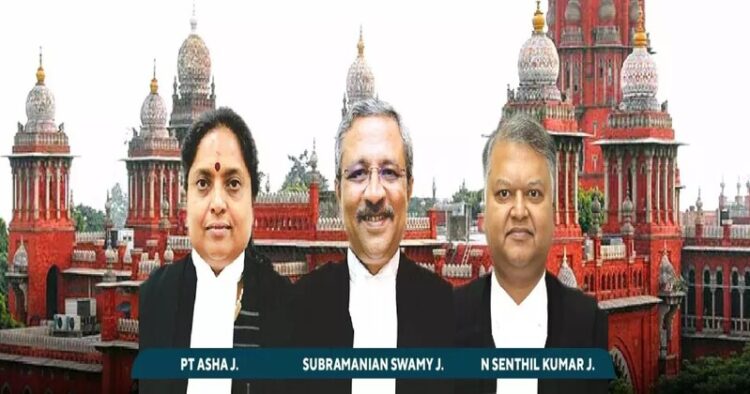In a significant legal development, the Madras High Court, through a full bench comprising Judges R Subramaanian, PT Asha, and N Senthilkumar, has clarified the writ jurisdiction over the Church of South India (CSI). While affirming the CSI’s status as a private religious entity, the court emphasised that public functions, such as the operation of schools and hospitals, are subject to writ jurisdiction.
The court’s ruling stems from conflicting opinions on the matter, with various single and division benches offering divergent perspectives. On April 13, 2014, a single judge approved the application of Article 226 against the CSI, but another division bench on May 30, 2017, contended that the diocese, as a private entity without public duties, cannot be directed under Article 226. Subsequently, in 2019, a single judge held that the CSI, running several institutions and hospitals, does discharge public functions, making disputes amenable to writ jurisdiction. However, matters related to internal elections and committee constitutions were deemed outside the purview of writ jurisdiction, a stance upheld by another division bench on February 25, 2020.
Faced with these conflicting opinions, the matter was referred to a full bench to determine whether a writ petition under Article 226 can be filed against the CSI, a private body, and under what circumstances such writs would be permissible.
The full bench unequivocally asserted that public functions conducted by the CSI, particularly its involvement in running schools, hospitals, and aided institutions, fall within the ambit of writ jurisdiction. The court clarified that while the religious functions of the church remain outside judicial review, actions detrimental to the discharge of public duties invite writ petitions.
The judgement highlighted the CSI’s extensive engagement in public duties, managing over 2,300 schools, 150 colleges, and 104 hospitals. This substantial involvement in education and healthcare, the court argued, subjects the CSI to writ jurisdiction, especially concerning adherence to statutory regulations and standards.
The court’s decision aligns with the principle that entities performing public duties, even if private, can be subject to judicial review under Article 226. The judgment cited a liberal interpretation of “any person or authority” in Article 226, as established by the Supreme Court, broadening the scope for individuals to invoke writ jurisdiction.
The bench, consisting of judges R Subramaanian, PT Asha, and N Senthilkumar, emphasised that the public functions conducted by CSI, such as running schools and hospitals, fall under the purview of writ jurisdiction. This decision is expected to have far-reaching implications for the oversight and regulation of educational and healthcare institutions operated by religious bodies.
The court justified its decision by highlighting CSI’s extensive engagement in public duties through the administration of numerous educational institutions and hospitals. Notably, CSI and the Church of South India Trust Association (CSITA) collectively manage 2,300 schools, 150 colleges, and 104 hospitals. The judges clarified that the public duty discharged by these institutions aligns with the constitutional principles enshrined in Article 21 and 21A.
The ruling draws a clear distinction between the ecclesiastical functions of the Church, such as administering churches and discharging clerical duties, and the broader public functions involving educational and healthcare facilities. While ecclesiastical functions remain outside the scope of judicial review under Article 226, the court affirmed that the management’s acts impacting education and medical services standards can be challenged through writ petitions.
The judges underscored that the term “any person or authority” in Article 226 requires a liberal interpretation when that person or authority performs a public duty. The Madras High Court cited the Supreme Court judgement in Dwarka Nath vs. Income Tax Officer to support this interpretation, emphasising the importance of a broader perspective in matters involving public duties.
Advocate S Thankasivan represented the petitioner, D Bright Joseph, while CSI, CSITA, Most Rev. A Dharmaraj Rasalam (Moderator-Synod Secretariat), Rt. Rev. Reben Mark (CSI), Adv. C Fernandas Rathina Raja, and Prof. C Fernandas Rathina Raja (CSI) were represented by senior advocate V Prabhakaran.
The judgment establishes a crucial precedent for the regulatory oversight of institutions managed by religious bodies, extending the scope of writ jurisdiction to ensure the maintenance of educational and medical standards in line with statutory regulations.




















Comments